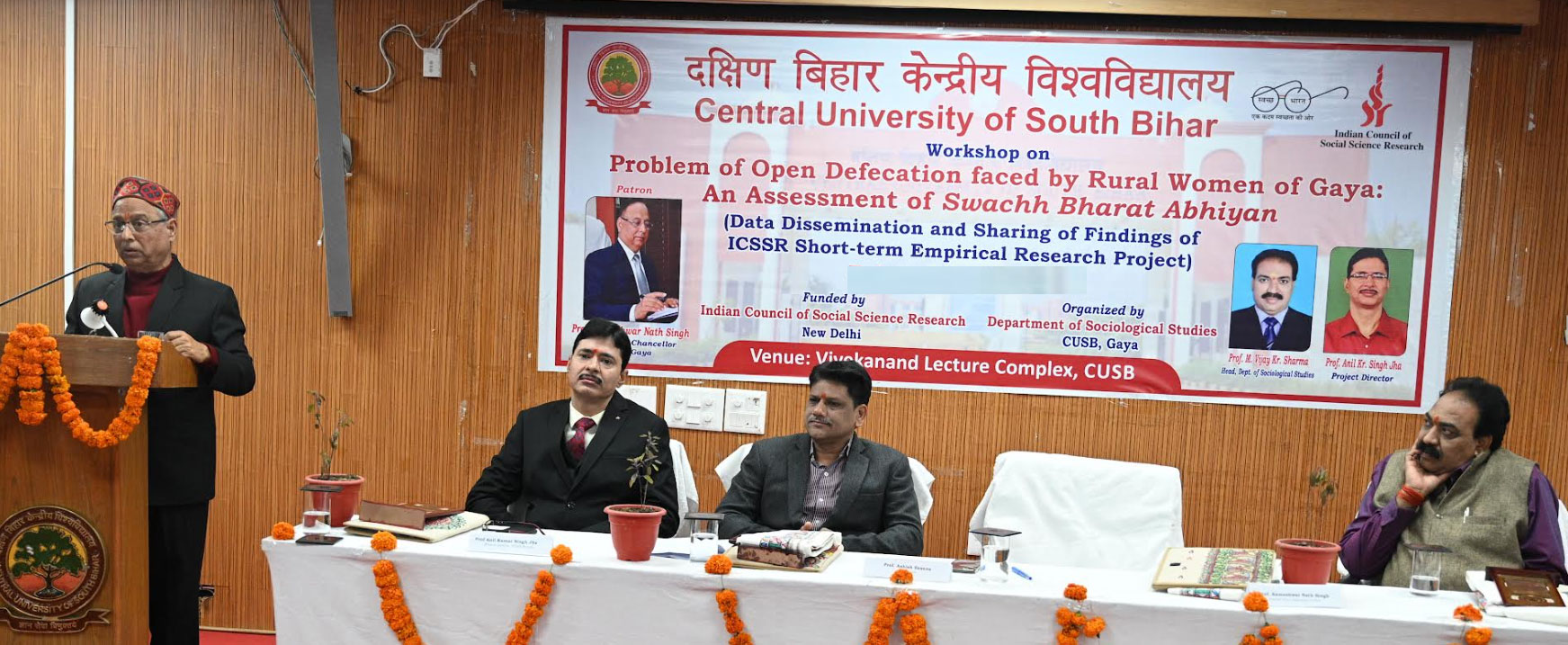Workshop on Problem of Open Defecation faced by Rural Women of Gaya, Dept. of Sociological Studies
- Posted by pro@cub.ac.in
- Categories Design / Branding
- Date February 14, 2024

A one-day Workshop on “Problem of Open Defecation faced by Rural Women of Gaya: An Assessment of Swachh Bharat Abhiyan” (Data Dissemination and sharing of Findings of ICSSR Short-term Empirical Research Project) was organized by the Department of Sociological Studies, Central University of South Bihar, Gaya on February 12, 2024 to decipher the impact of Swachhh Bharat Abhiyan in minimizing the practice of open defecation.
Swachh Bharat Abhiyan plays major role in minimizing the practice of open defecation. The gendered dynamics of open defecation underscore the close inter-linkages between gender, culture, attitude, poverty, and sustainable development. Although the problem of sanitation affects men and women equally, the conditions worsen for women. This is because women going out for sanitation have to face other issues like rape and molestation. Poor sanitation epitomizes the ugly face of the society which is not only offensive to human dignity and human rights but also creates an appalling social condition.
The Workshop, funded by the ICSSR, New Delhi, was organized to share the findings of ICSSR Project on “Problem of Open Defecation faced by Rural Women of Gaya: An Assessment of Swachh Bharat Abhiyan” with the selected respondents, ASHA, JEEVIKA didi, Anganwadi workers, Sarpanch, Mukhiya, women and men of rural Gaya, NGO representatives, etc. The inaugural session was presided over by the Hon’ble Vice-Chancellor of CUSB, Prof. Kameshwar Nath Singh, chief guest Prof. Ashish Saxena, (Professor and Head, Dept. of Sociology Allahabad University, Prayagraj), Prof. M. Vijay Kumar Sharma (Head, Dept. of Sociological Studies) and Prof Anil Kumar Singh Jha (Project Director, ICSSR Project).
Hon’ble Vice-Chancellor Prof. Kameshwar Nath Singh shared his thoughts in his Presidential Address and highlighted the role of rich Indian cultural heritage in the field of sanitation. He also explained the different efforts and schemes of society and government. Highlighting the role of Mahatma Gandhi in this field Prof. Singh said that sanitation was more important than independence. He made cleanliness and sanitation an integral part of the Gandhian way of living. Remembering his contributions to the issue of sanitation, Prime Minister of India, Hon’ble Shri Narendra Modiji launched the Swachchh Bharat Abhiyan throughout length and breadth of the country as a national movement on October 02, 2014. The Swachh Bharat Abhiyan is the most significant cleanliness campaign by the Government of India, which plays important role in achieving the target of VIKSIT BHARAT @2047.
At the outset, introductory remarks was delivered by Prof Anil Kumar Singh Jha, he argued that it is not the resources but rather the beliefs, practices and customs of people related to health and environment that matter in improving the sanitary conditions in India. Sandwiched between the problem of sanitation and traditional patriarchal mind-set of people, rural women of Gaya suffer a lot. Swachh Bharat Abhiyan plays a major role in improving the mind-set of the people and condition of the society. The term ‘Sanitation is used five times in National Education Policy 2020 (NEP-2020), which indicates the importance of sanitation is academic world. In his welcome address, Prof. M. Vijay Kumar Sharma welcomed all the guests, experts and participants of the Workshop and highlighted the interconnectedness of sanitation, environment and society. He also informed that keeping in mind the importance of sanitation issue, the Department offers course on Sociology of Sanitation for PG students. Next on the dais was Prof. Ashish Saxena, who delivered his ideas on the major themes and perspectives of the Workshop. He shared his rich experience in the field of sanitation and stressed that better sanitation is needed not only for healthy body but also for the healthy society and healthy nation.
The second session was started with the lecture of Resource Person Dr. Vijaylaxmi Saxena (Allahabad University, Prayagraj), who discussed interconnectedness of sanitation, health and environment from gender perspective and said that Swachchh Bharat Abhiyan is helpful in providing dignified life to rural women. Ms. Rituparna Paul (Research Assistant, ICSSR Project) discussed in detail about the objective, methodology, findings and recommendations of the ICSSR Project. Ms. KM. Reetu Rani (Field Investigator, ICSSR Project) shared her field experiences and some case studies related to Project. The stakeholder (i.e. respondents, ASHA, JEEVIKA didi, Anganwadi workers, Sarpanch, Mukhiya, women and men of rural Gaya, NGO representatives, etc.) shared their experiences, suggested some measures to improve the situation. Prof. Deepak Kumar (Professor and Head, PG Dept. of Sociology, Magadh University, Bodh Gaya) in his valedictory address remarked that there is close connection between cultural, tradition, moral values, health and sanitation. He highlighted the socio-cultural aspects of sanitation and shared some success stories of Swachchh Bharat Abhiyan. Prof. M. Vijay Kumar Sharma and Prof Anil Kumar Singh Jha also shared their ideas in the Valedictory session. Ms. KM. Reetu Rani and Ms. Rituparna Paul proposed vote of thanks in inaugural and valedictory sessions respectively.





